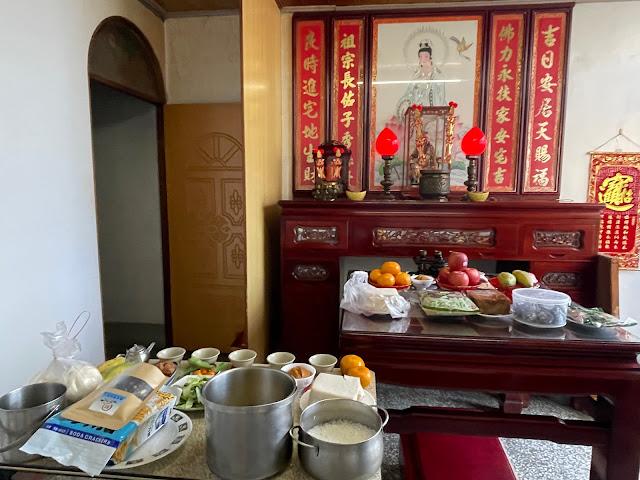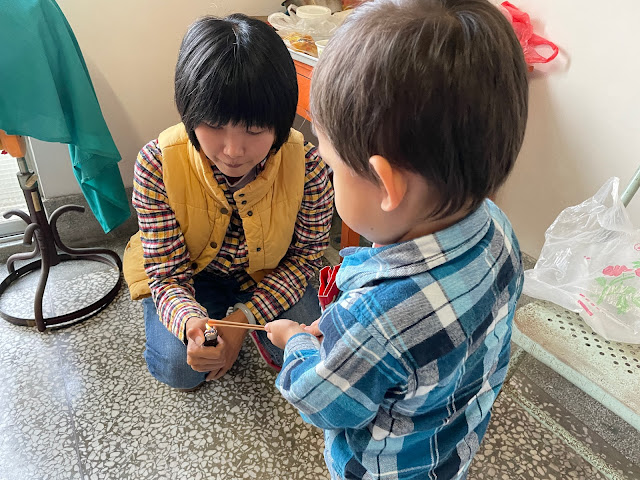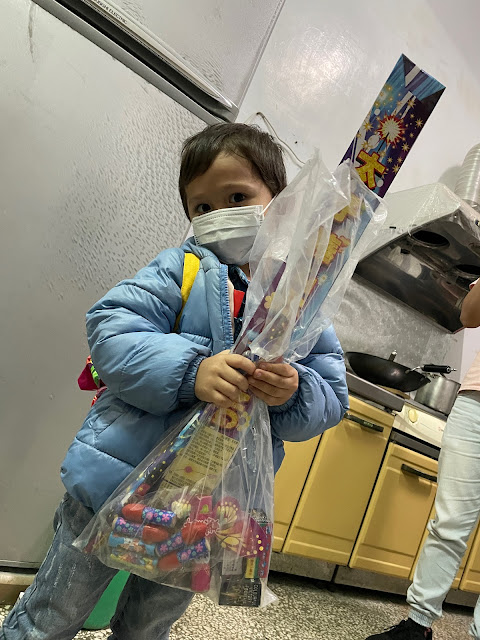Happy Lunar New Year! Today is New Year's Eve (31.01.2022), so we returned to my parents-in-law's place to celebrate. My husband and I prepared decorations and put up couplets on the doors. While my parents-in-law prepared food for the prayers and celebrations later, we went out to find some food for ourselves. It was quite difficult to find an open restaurant. Afterward, we bought scratch cards, two for ourselves and two as a gift for my parents-in-law. We spent 400NT on ours, but unfortunately, none of them had a winning number this year. We weren't lucky.
In the afternoon, my husband went out to meet his friends, but my sister-in-law kept me company. She taught me and Adrian how to make soap at home. We were all ready to move the food upstairs to the Buddha Room when my husband came back, just in time to join us. I feel like there was much more food this year compared to the past, and I have developed a liking for more types of food. We took some incense and prayed there, performing a small ceremony of pouring water in cups for our ancestors. As new members of the family, Adrian and I also participated in this ritual. After a few minutes, we were ready to move all the food downstairs and enjoy our dinner. My husband and I warmed everything before eating, and my sister-in-law took our son to buy fireworks.
Some of the food we had today included bok choy, beans, mushrooms, vegetarian meatballs, radish cake, and sweet treats like New Year Cake (nian gao). I will be writing another post in the future to introduce Lunar New Year food and its significance.
Later on, we went to an empty parking lot to play with fireworks. Actually, I haven't played with fireworks much in the past, so I thought it might be dangerous for a small child like Adrian. They lit incense sticks and Adrian was really happy about it. Actually, I had a nice day too. We felt closer and more like a family, even though we barely speak much due to my limited Chinese (and the fact that I don't like talking too much). We don't have a good relationship with my sister-in-law as she often causes trouble and creates conflicts that make everyone dislike her. However, today she was really nice.
Unlike Christmas, the date of Chinese New Year changes each year. It always falls between January 21 and February 20 and is determined by the lunar calendar. This year (2022), New Year is celebrated on February 1st.
Every Chinese New Year marks the beginning of a new animal's zodiac year. There are 12 Chinese zodiac animals in order: Rat, Ox, Tiger, Rabbit, Dragon, Snake, Horse, Goat, Monkey, Rooster, Dog, and Pig. 2022 is the Year of the Tiger.
The festival is celebrated for 16 days, culminating in the Lantern Festival. Traditionally, each of the 16 days from Chinese New Year's Eve to the Lantern Festival had its own special celebration activity.
How to wish Happy New Year in Chinese?
新年好 (Xīnnián hǎo) - to wish a Good New Year
新年快乐 (Xīnnián kuàilè) - to wish a Happy New Year
恭喜发财 (Gōngxǐ fācái) - to wish prosperity and wealth
大吉大利 (Dàjí dàlì) - to wish luck and great fortune
年年有余 (Nián nián yǒuyú) - to wish abundance (endless fish)
步步高升 (Bùbù gāo shēng) - to wish someone will move up in the world
五福临门 (Wǔfú línmén) - to wish someone five blessings (longevity, luck, safety, morality, satisfaction)
合家团圆 (Hé jiā tuányuán) - to wish family reunion
虎虎生风 (Hǔ hǔ shēng fēng) - to wish the strength and vigor of a Tiger
Traditions and Activities during New Year
Chinese New Year's Eve (Jan. 31, 2022)
Putting Up New Year Decorations
Houses are decorated with red lanterns, red spring couplets, paper cuttings, and New Year's paintings to keep evil away and pray for blessings, longevity, health, and peace.
Offering Sacrifices to Ancestors
Offering sacrifices to ancestors is an important practice during Chinese New Year as a way to show respect and piety. It is believed that ancestral spirits protect their descendants and bring them prosperity.
On Chinese New Year's Eve, many people worship their ancestors before the reunion dinner, symbolically allowing their ancestors to "eat" first. Offerings such as meat, wine, joss sticks, and joss paper are placed in front of the ancestral shrine. However, if your parents-in-law are vegetarian, they may offer fruits or cakes as common alternatives, such as nian gao or fa gao. These offerings are a way to honor and remember the ancestors and seek their blessings for the coming year.
Enjoying a Reunion Dinner
The Lunar New Year's Eve reunion dinner is a significant and cherished tradition where all family members come together to celebrate. It's considered a "must-do" dinner to welcome the new year. During this special meal, dishes with symbolic meanings are often prepared to bring good luck and prosperity for the coming year.
Some of the traditional dishes commonly included in the reunion dinner are fish, dumplings, Nian Gao (sticky rice cake), and spring rolls. Fish symbolizes abundance and prosperity, dumplings represent wealth and good fortune, Nian Gao signifies growth and advancement, and spring rolls symbolize wealth and a fresh start. These dishes are believed to bring luck and blessings to the family.
Although in my in-laws' house, the food is more focused on vegetarian options such as rice, radish cake, and leafy vegetables. I have never experienced a traditional Lunar New Year dinner that includes non-vegetarian dishes.
Watching New Year Gala
Watching the New Year Gala has become a customary tradition for many families. The Gala typically begins at 8 pm and continues until midnight when the Chinese New Year arrives. When I was living with my in-laws, they would always watch it, but I personally found it a bit outdated.
Giving Red Envelopes (Lucky Money) to Kids
Another tradition during Lunar New Year is giving red envelopes, also known as lucky money, to kids. Parents usually give these envelopes to their children after the reunion dinner, expressing their wishes for their children's health, growth, and success in the upcoming year. The money inside the red envelopes is believed to bring good luck, as the color red is considered auspicious in Taiwan.
Staying Up Late
Staying up late on Lunar New Year's Eve is a custom known as "shousui" (守歲), which means to keep watch over the year. In the past, people used to stay up all night, but nowadays most people stay up until midnight when the firecrackers and fireworks have subsided.
Buying lottery or cratch cards
Another popular activity during Lunar New Year is buying lottery tickets or scratch cards. Lottery and scratch cards are highly sought after during this time, and lottery shops are often crowded as people hope for a chance to win. We also decided to try our luck and purchased some scratch cards. Fortunately, our winnings covered the cost of the scratch cards, bringing some extra excitement to the festivities.
Chinese New Year's Day (Feb. 1, 2022)
Setting Off Firecrackers and Fireworks
It's believed that the louder the firecrackers, the better and luckier it will be for business and farming in the coming year. This tradition originated from the legend of the monster called Nian, which would emerge on New Year's Eve to devour villagers and destroy their homes. The discovery that burning dry bamboo created explosive sounds scared away the monster, leading to the use of firecrackers during Chinese New Year.
Putting on New Clothes and Extending New Year Greetings
On the first day of Lunar New Year, people dress in new clothes and greet each other with phrases like "gongxi" (恭喜), which means greetings or best wishes.
Watching Lion and Dragon Dances
Lion and dragon dances are popular performances on Lunar New Year's Day. These vibrant and lively dances symbolize good luck, fortune, and warding off evil spirits.
Public Celebrations at Parks and Temple Fairs
Public celebrations take place in parks and temple fairs during Chinese New Year. These events often feature cultural performances, traditional games, food stalls, and other festive activities.
Chinese New Year: Day 2 (Feb. 2, 2022)
Traditionally, married daughters visit their parents' homes on the second day of Chinese New Year. They bring gifts and red envelopes (lucky money) to their families and relatives. On this day, people also offer sacrifices to the God of Wealth, hoping for a more prosperous year ahead.
Lunar New Year: Days 3–7 (Feb. 3–7, 2022)
From the third to the seventh day of the Lunar New Year, people visit relatives and friends to extend greetings and exchange gifts.
Chinese tradition discourages cleaning homes during the first two days of the New Year, as sweeping during this time is believed to sweep away the accumulated good luck from firecrackers, red paper, wrappers, and other signs of celebration. The first house-sweep usually takes place after these initial days.
New Year: Day 8 (Feb. 8, 2022)
On the eighth day, people typically return to work. The number eight is considered highly auspicious in Taiwan, so many businesses choose to reopen on this day to attract good luck.
New Year: Day 15 (Feb. 15, 2022) - Lantern Festival
The fifteenth day of the New Year is known as the Lantern Festival (元宵節). It marks the traditional end of the Spring Festival celebrations. During this festival, people release floating lanterns onto the sea or rivers or send glowing lanterns into the sky, creating a beautiful spectacle of lights.





























0 komentarze:
Post a Comment